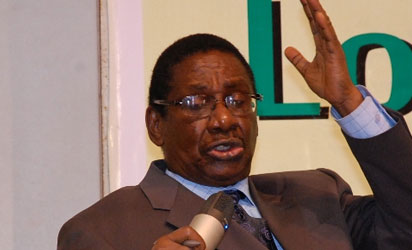Human rights lawyer, Mr. Femi Falana (SAN), has urged the House of Representatives not to lend its support to the ongoing process of amending the Code of Conduct Bureau and Tribunal Act in the Senate.
In his letter dated April 15, 2016, addressed to the Speaker of the House of Representatives, Mr. Yakubu Dogara, Falana described the proposed amendment by the upper legislative chamber as illegal and self serving.
The letter titled, ‘Re: Proposed Amendment of the Code of Conduct Bureau and Code of Tribunal Act by the National Assembly’, was copied the Senate President, Dr. Bukola Saraki.
Falana said going by the nature of the CCB/T Act which is a duplication of provisions of the Constitution, the amendment could not be valid without amending the Constitution.
He said in the letter to Dogara, a copy of which was made available to our correspondent on Sunday, that the ongoing process at the Senate was in violation of section 4(2) of the Constitution.
He said the constitutional provision only empowered the National Assembly to make laws “for the peace, order and good government of the Federation or any part thereof.”
Saraki is currently being prosecuted before the Code of Conduct Tribunal on various alleged infractions, including false assets declaration, which are criminalised by the law being sought to be amended by the Senate.
But Falana explained that going by the constitutional provision prohibiting the enactment of any law with retroactive effect, the Senate ought to know that that the amendment would have no effect on Saraki’s trial.
He said, “In the light of the authoritative pronouncement of the Supreme Court on lack of legislative powers on the part of the National Assembly to enact laws which have similar provisions to those of the Constitution section 3 of the Act has become a duplication of the relevant constitutional provision.
“Consequently, its proposed amendment is illegal and unconstitutional. In other words, without amending the relevant provisions of the Constitution the proposed amendment of the Act is an exercise in futility.
“As the proposed amendment cannot alter, enlarge or curtail the relevant provisions of the Constitution the Senate ought not to continue to waste precious time and resources on the illegal exercise.
“Since the Constitution has prohibited the enactment of ex post facto laws in circumstances of this nature the National Assembly ought to know that the ongoing moves to amend the Act cannot have any effect on the celebrated trial of the Senate President.
“Having solemnly sworn to strive to preserve the Fundamental Objectives and Directive Principles of State Policy contained in the Constitution the members of the National Assembly should stop subverting the obligation of the Federal Government to ‘abolish all corrupt practices and abuse of power.’
“In view of the foregoing, we are compelled to urge the House of Representatives ably led by your good self not to lend its weight to the illegal amendment of the Act.”
Falana recalled that, though, the House of Representatives had yet to commence deliberations on the Bill for the amendment of the Act, the Senate passed it for the second last week, barely 48 hours after its presentation by its sponsor, Senator Peter Nwaoboshi.
He urged the House of Representatives to to persuade the Senate to terminate further proceedings on the bill, predicting that it (the bill) would be caught by the same fate which befell the amendment of the Corrupt Practices and other Related Offences Act 2000 in 2003.
Falana said, “You may wish to remind your colleagues in the House that when the Corrupt Practices and other Related Offences Act 2000 was amended in 2003 on account of the investigation of allegations of corrupt practices involving the leadership of the Senate the Federal High Court set aside the amendment as it violated the Constitution.
“As the same fate certainly awaits the Bill to amend the Code of Conduct Bureau and Code of Conduct Tribunal Act it is hoped that the House will persuade the Senate to terminate further debates on it.”
He said though Saraki, who is being prosecuted on the strength of the law sought to be amended, had been staying away from the amendment proceedings, the process was in violation of paragraph 1 of the Code of Conduct for Public Officers enshrined in Part 1 of the Fifth Schedule to the Constitution.
He quoted the provision of the paragraph 1 of the Code of
Conduct for Public Officers enshrined in Part 1 of the Fifth Schedule to the Constitution, as stating, “A public officer shall not put himself in a position where his personal interest conflicts with his duties and responsibilities.”
Falana described as invalid and inoperative the section 3 of the Act which the sponsor of the bill seeks its amendment.
He quoted Nwaoboshi as stating that the bill was to provide”for an opportunity for the person whose rights and obligations may be affected to make representations to the administering authority before that authority makes the decision affecting that person.”
“With respect, section 3 of the Act is in pari materia with Paragraph 3(e) of Part 1 of the Third Schedule to the Constitution. To that extent, section 3 of the Act is inoperative and invalid in every material particular.”
He restated that as held by the Supreme Court in Attorney-General of Abia v Attorney-General of the Federation (2001), any Act whose provisions are similar to or inconsistent with existing provisions of the Constitution would be null and void.
Punch……
This page has been viewed 312 times


























